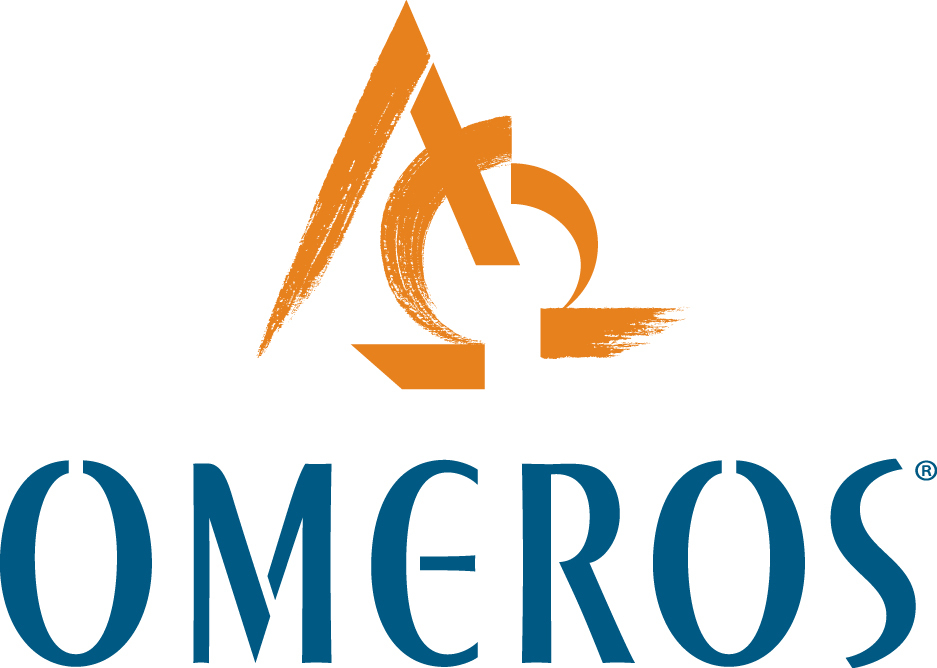– The Steering Committee brings together distinguished clinical experts in AML from leading National Comprehensive Cancer Network Centers –
SEATTLE--(BUSINESS WIRE)--Omeros Corporation (Nasdaq: OMER) today announced the establishment of the Omeros Oncology Clinical Steering Committee to advance Omeros’ OncotoX biologics program focused on acute myeloid leukemia (AML). AML is the most fatal form of leukemia and accounts for approximately 80 percent of acute leukemias in adults and one-third of all cancers affecting the blood/bone marrow, representing a high unmet need. Omeros’ OncotoX program for AML consists of proprietary targeted, engineered molecules (about half the size of an antibody) that deliver a toxic payload within the cancer cells, thereby killing them.
Members of the Omeros Oncology Clinical Steering Committee include:
- Naval Daver, M.D., Professor and Director of the Leukemia Research Alliance Program in the Department of Leukemia at MD Anderson Cancer Center (Chair of the Omeros Oncology Clinical Steering Committee)
- Aref Al-Kali, M.D., Chair of the Acute Myeloid Group and Research Chair of the Acute Leukemia and Myeloid Neoplasms Disease Group at Mayo Clinic
- Jessica K. Altman, M.D., Professor of Medicine in the Division of Hematology and Oncology and Director of the Leukemia Program of Robert H. Lurie Comprehensive Cancer Center at Northwestern University
- Jayastu Senapati, M.B.B.S., M.D., D.M., Assistant Professor in the Department of Leukemia at MD Anderson Cancer Center
- Mithun Shah, M.D., Ph.D., Assistant Professor of Medicine and Oncology, and Consultant in the Division of Hematology at Mayo Clinic
- Anthony S. Stein, M.D., Co-director of the Gehr Family Center for Leukemia Research within the Hematologic Malignancies and Stem Cell Transplantation Institute at City of Hope
- Eytan M. Stein, M.D., Chief of the Leukemia Service and Director of the Program for Drug Development in Leukemia in the Division of Hematologic Malignancies at Memorial Sloan Kettering Cancer Center
- Roland B. Walter, M.D., Ph.D., M.S., Professor in the Translational Science and Therapeutics Division and José Carreras/E. Donnall Thomas Endowed Chair for Cancer Research at the Fred Hutchinson Cancer Center
The steering committee will, among other activities, assist Omeros with development of the OncotoX-AML program, clinical trial design and interactions with institutional review boards and will participate in OncotoX-AML clinical trials.
“AML is a devastating disease, and these patients have difficulty tolerating the side effects of chemotherapeutic agents and current antibody-drug conjugates, which generally have a narrow therapeutic index,” stated Naval Daver, M.D., Professor and Director of the Leukemia Research Alliance Program in the Department of Leukemia at MD Anderson Cancer Center and Chair of the Omeros Oncology Clinical Steering Committee. “The OncotoX platform is designed to kill only dividing cancer cells while sparing normal cells. In animal models using cell lines derived from AML patients, the OncotoX-AML molecule has shown superior efficacy to current standard of care in AML treatment, and its potential utility extends broadly beyond AML to other types of leukemia. Together with my esteemed physician-scientist colleagues on the steering committee, I look forward to advancing the Omeros therapeutic for AML and bringing this novel treatment to patients as quickly as possible.”
Across extensive in vivo and ex vivo studies, the OncotoX-AML therapeutic has shown to be highly effective even at very low doses, providing a significant survival benefit over currently approved combination therapy (venetoclax and azacytidine). These studies, conducted with human cell lines in well-established animal models and considered predictive of clinical response, have targeted AML tumors with mutational backgrounds commonly found in nearly 90 percent of AML patients (TP53, NPM1, KMT2a, and FLT3) indicating that the OncotoX-AML therapeutic could be “mutation-agnostic,” a currently large unmet need for oncologists and their patients. In studies using primary AML derived from patients, the OncotoX molecule preferentially and efficiently kills AML blasts (abnormal myeloid cells). OncotoX-AML also targets leukemia stem cells (LSC), which are often refractory to chemotherapy and represent another major challenge in the treatment of AML. The OncotoX-AML therapeutic is designed specifically to kill both AML blasts and LSCs that can lead to relapse. Preliminary in vivo tolerability studies demonstrate that the OncotoX therapeutic is well tolerated at doses substantially greater than one order of magnitude above efficacious doses without causing neutropenia or meaningful changes in blood chemistry values.
Omeros is initiating IND-enabling work for its OncotoX-AML therapeutic. Clinical efficacy in AML, considered one of the most aggressive leukemias, is thought to bode well for a therapeutic agent’s broad applicability across leukemias. In addition to OncotoX-AML, Omeros’ portfolio of oncology platforms include signaling and antigen-driven immunomodulators, immune memory-enhancing immunostimulators, and an adoptive T-cell technology that, unlike other cell therapy approaches, does not require cellular engineering.
“We are very pleased to be working with all the members of our oncology steering committee,” said Gregory A. Demopulos, M.D., Omeros’ Chairman and Chief Executive Officer. “Each is an internationally recognized leader in the fields of leukemia and AML and has been integrally involved in the development of new treatments for their patients. Their willingness to invest time and effort in our OncotoX-AML program is a strong endorsement of our molecule’s potential and, with their help, we look forward to assessing this next-generation therapeutic in AML patients.”
In the U.S. alone, AML is diagnosed in over 20,000 patients annually and is responsible each year for more than 11,000 deaths. In 2030, the global AML therapeutic market size is projected to be over $6 billion with the leukemia therapeutic market forecast at $29 billion.
About Omeros’ Oncology Programs
Omeros’ oncology programs are informed by a deep understanding of both the innate (complement-mediated) and adaptive (CD4 & CD8 T-cells) immune systems to derive highly differentiated, first-in-class therapeutic programs to treat a wide range of cancers. While significant progress has been made within oncology through targeted therapies, advanced biologics and immuno-therapies, toxicity and efficacy shortcomings remain significant. Omeros is focused on moving beyond these approaches with a family of wholly novel molecular and cellular platforms designed to be more effective, targeting both cell-surface and intracellular cancer antigens, with less toxicity. Our oncology franchise involves three distinct platforms – OncotoX, immunomodulators, and immunostimulators in combination with adoptive T-cell therapy. IND-enabling work has been initiated to advance to clinic our OncotoX-AML program comprised of engineered molecules designed to target and kill cancer cells with precision. Our immunomodulator platform is based on our identifying and evidencing the importance of certain molecules that selectively target T cells to regulate and potentiate immune responses. Our adoptive T-cell technology, unlike other cell therapy approaches, does not require cellular engineering and is being developed in concert with our immunostimulator platform to advance beyond the challenges of current vaccine approaches, which induce only transient and ineffective immune responses. By combining tumor antigens with a potent adjuvant, these novel, engineered biologics are designed specifically to target and activate antigen-presenting cells, leading to amplification of cancer-specific T and B cells to eliminate existing tumor cells and, importantly, to generate immune memory against future cancer relapse. Collectively, our portfolio of oncology platforms has the potential to deliver substantially more effective and safer treatments broadly across hematological malignancies and solid tumors.
About Omeros Corporation
Omeros is an innovative biopharmaceutical company committed to discovering, developing and commercializing first-in-class small-molecule and protein therapeutics for large-market and orphan indications targeting immunologic disorders, including complement-mediated diseases and cancers, as well as addictive and compulsive disorders. Omeros’ lead MASP-2 inhibitor narsoplimab targets the lectin pathway of complement and is the subject of a biologics license application pending before FDA for the treatment of hematopoietic stem cell transplant-associated thrombotic microangiopathy. Omeros’ long-acting MASP-2 inhibitor OMS1029 has successfully completed Phase 1 single- and multiple-ascending dose clinical studies. Zaltenibart, Omeros’ inhibitor of MASP-3, the key activator of the alternative pathway of complement, is in Phase 3 clinical development for paroxysmal nocturnal hemoglobinuria and is being evaluated in an ongoing Phase 2 clinical trial for complement 3 glomerulopathy. Funded by the National Institute on Drug Abuse, Omeros’ lead phosphodiesterase 7 inhibitor OMS527 is in clinical development for the treatment of cocaine use disorder. Omeros also is advancing a broad portfolio of novel cellular and molecular immuno-oncology programs. For more information about Omeros and its programs, visit www.omeros.com.
Forward-Looking Statements
This press release contains forward-looking statements within the meaning of Section 27A of the Securities Act of 1933 and Section 21E of the Securities Exchange Act of 1934, which are subject to the “safe harbor” created by those sections for such statements. All statements other than statements of historical fact are forward-looking statements, which are often indicated by terms such as “aim,” “anticipate,” “believe,” “could,” “estimate,” “expect,” “goal,” “intend,” “likely,” “look forward to,” “may,” “objective,” “plan,” “potential,” “predict,” “project,” “should,” “slate,” “target,” “will,” “would” and similar expressions and variations thereof. Forward-looking statements, including statements regarding the anticipated safety and therapeutic benefits of Omeros’ drug candidates and plans for future development thereof are based on management’s beliefs and assumptions and on information available to management only as of the date of this press release. Omeros’ actual results could differ materially from those anticipated in these forward-looking statements for many reasons, including, without limitation, our financial condition and results of operations, inability to raise capital when required to fund our operations and development plans, unfavorable, unexpected or inconclusive results of our preclinical and clinical development activities, unexpected outcomes of regulatory processes in relevant jurisdictions, including those associated with other Omeros’ development programs, challenges associated with manufacture or supply of our drug candidates or other materials needed to support preclinical and clinical development, intellectual property claims, competitive developments, litigation, and the risks, uncertainties and other factors described under the heading “Risk Factors” in our Annual Report on Form 10-K filed with the Securities and Exchange Commission on March 31, 2025. Given these risks, uncertainties and other factors, you should not place undue reliance on these forward-looking statements, and we assume no obligation to update these forward-looking statements, whether as a result of new information, future events or otherwise, except as required by applicable law.
Contacts
Jennifer Cook Williams
Cook Williams Communications, Inc.
Investor and Media Relations
IR@omeros.com





